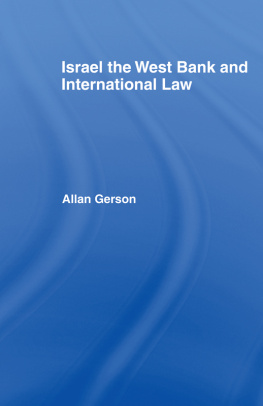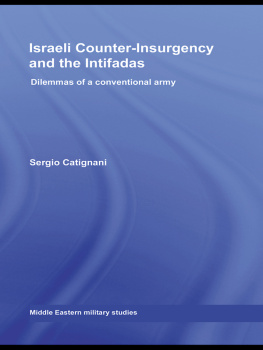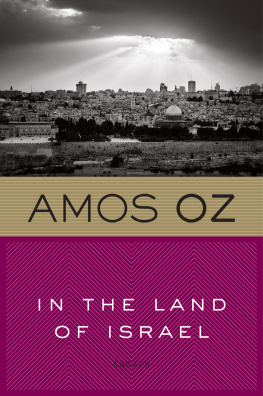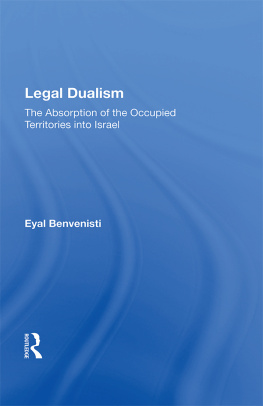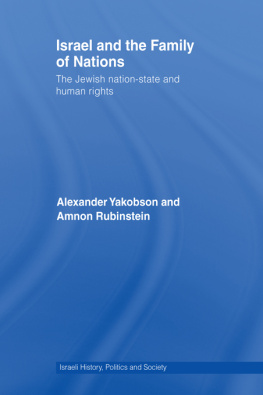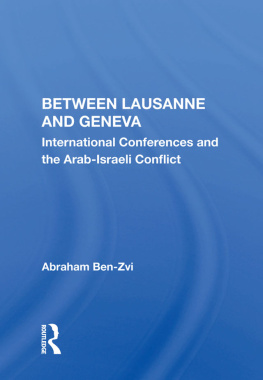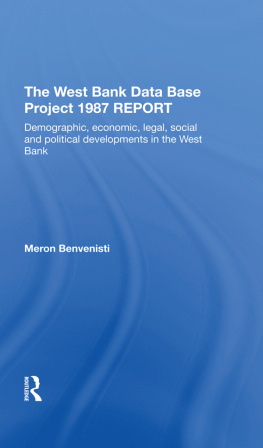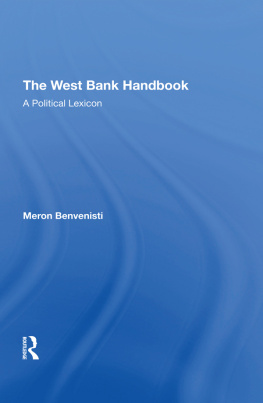Gerson - Israel the West Bank and International Law
Here you can read online Gerson - Israel the West Bank and International Law full text of the book (entire story) in english for free. Download pdf and epub, get meaning, cover and reviews about this ebook. City: Hoboken, year: 2012, publisher: Taylor & Francis (CAM), genre: Politics. Description of the work, (preface) as well as reviews are available. Best literature library LitArk.com created for fans of good reading and offers a wide selection of genres:
Romance novel
Science fiction
Adventure
Detective
Science
History
Home and family
Prose
Art
Politics
Computer
Non-fiction
Religion
Business
Children
Humor
Choose a favorite category and find really read worthwhile books. Enjoy immersion in the world of imagination, feel the emotions of the characters or learn something new for yourself, make an fascinating discovery.
Israel the West Bank and International Law: summary, description and annotation
We offer to read an annotation, description, summary or preface (depends on what the author of the book "Israel the West Bank and International Law" wrote himself). If you haven't found the necessary information about the book — write in the comments, we will try to find it.
Gerson: author's other books
Who wrote Israel the West Bank and International Law? Find out the surname, the name of the author of the book and a list of all author's works by series.
Israel the West Bank and International Law — read online for free the complete book (whole text) full work
Below is the text of the book, divided by pages. System saving the place of the last page read, allows you to conveniently read the book "Israel the West Bank and International Law" online for free, without having to search again every time where you left off. Put a bookmark, and you can go to the page where you finished reading at any time.
Font size:
Interval:
Bookmark:
ISRAEL, THE WEST BANK AND INTERNATIONAL LAW
Israel, The West Bank and International Law
Allan Gerson

First published 1978 in Great Britain by
FRANK CASS AND COMPANY LIMITED
2 Park Square, Milton Park,
Abingdon, Oxon, 0X14 4RN
and in the United States of America by
FRANK CASS AND COMPANY LIMITED
270 Madison Ave, New York NY 10016
Transferred to Digital Printing 2006
Copyright 1978 Allan Gerson
British Library Cataloguing in Publication Data Gerson, Allan
Israel, the West Bank and international law.
1. Jordan (Territory under Israeli occupation, 1967-) International status
I. Title
341.42 JX4084. J /
ISBN 0-7146-3091-8
All Rights Reserved.No part of this publication may be reproduced in any form or by any means, electronic, mechanical, photocopying, recording or otherwise, without the prior permission of Frank Cass and Company Limited in writing.
Filmset by A. Brown & Sons Ltd., Hull.
Acknowledgments
I am grateful to a number of people and institutions for their individual and collective assistance during the preparation of this manuscript, especially to the Yale Law School under whose auspices this work was undertaken as a doctoral dissertation, and to Professor Eugene V. Rostow, who supervised the project. Bringing to bear his vast knowledge of law and diplomacy, he added immeasurably to the progress of this work. I am indebted to Professor Leon S. Lipson for his careful reading and criticism; to Professor Joseph W. Bishop for many insightful case comments; to Professor Myres S. McDougal for direct exposure to his incomparable scholarship; and to Professor Michael V. Reisman for the wit and the learning he brought to our discussions, and for his assistance in countless ways. The manuscript has been revised since its presentation in doctoral form in 1976 to account for new developments. However its basic arguments, like the problems of law and diplomacy which they address, remain largely unchanged.
In the course of research conducted in Israel, the West Bank and Jordan, many interviews, attributable and not, were conducted with government officials, political leaders, journalists and other close observers of Israel-West Bank relations. They exposed me to many facets of the problem which would have gone unseen but for their kindness. I thank them collectively.
My appreciation is extended to the University Consortium for World Order Studies for providing generous fellowship assistance in the 197374 academic year; to Mr. Jan Stephan, librarian of the Harvard International Law Library for providing research space and much kind assistance; and to the Harvard International Law Journal for printing of this work in its summer 1977 issue.
Finally, I thank my wife, Joan, for gracefully persevering through my years of preoccupation.
ALLAN GERSON
Washington, D.C.
December, 1977
Introduction
For nearly four hundred years, until conquered by Britain in 1917, the regions now known as Israel, the West Bank, Jordan and the Gaza Strip formed part of the Ottoman Empire and were governed as a portion of the Vilayet or Province of Southern Syria. In 1922 Britain accepted responsibility for governing this area, termed Palestine, in accordance with the terms of a mandate entrusted to it by the League of Nations. Its cardinal precept, like that of all mandates, was that self- determination be encouraged. But in Palestine self- determination was to take a different form. A national home was to be established for a dispersed people whose members constituted only a small percentage of the population of the mandated territory.
Almost immediately after the inception of the Palestine Mandate, Britain invoked Article 25 of its provisions to postpone or withhold Jewish national rights east of the Jordan River. Its effect was to confine the ambitions of the Zionist movement to Cis-Jordanian Palestine. But there the Arab population opposed the birth of any Jewish statesmall or large. A compromise between these competing national interests in the form of partition was suggested several times in the years between the two great wars but never sought to be implemented by Britain. Partition was, however, an idea that could not remain dormant for long. Increasingly, it appeared as the only means for equitably resolving the dispute over Cis-Jordanian Palestine.
At the end of World War II, amidst Zionist claims for immediate statehood, fierce Arab nationalist opposition and a faltering British administration, the United Nations became vested with the responsibility for finding a solution to the worsening situation. Trans-Jordan had already become independent in 1946. What remained at issue was whether a trusteeship for Palestine be implemented, whether Palestine should somehow be partitioned or whether it should be restructured as a bi-national federal state. The United Nations recommended partition: a second Arab Palestinian state was to be created alongside a new Jewish state.
However, the Arab Palestinians and their allies insisted that all of Palestine be under Arab sovereignty. The 1948 war ensued. In its course, the West Bank, which was intended to form the bulk and heart of the new Arab Palestinian state, fell under Jordanian control. The Gaza Strip, with which it was to be linked, fell under Egyptian rule. Then in the 1967 war Israel gained control.
The problems Israel was to face in administering the West Bank were similar to, and yet very different from, those faced in governing the Gaza Strip. The international legal status of both regions was clouded. In both, Israel continued to apply the pre-existing law of Jordan and Egypt. The West Bank, however, became the focal point of demands for Israeli withdrawal and implementation of self-determination.
Unlike the Gaza Strip, a small impoverished area of roughly 600 square miles with 400,000 inhabitants, mostly refugees, the West Bank boasts 2,270 square miles, much of it rich in agricultural resources. Only a small portion of its population of 700,000 are refugees. Most live in the historic towns of Hebron, Nablus, Ramallah and East Jerusalem. Their communal attachments run deep. Even while under the central authority of Amman between 1950 and 1967 strong local leadership flourished. Yet, the ties of West Bankers to Jordan remain firm. Families are interspersed between both banks. The majority of Jordans population today consists of Palestinians. Jordan is the chief market for West Bank agricultural produce and its link to the larger Arab world.
The West Bank is, however, also a focal point of identification for Jewish nationalists. They view it as the site of their past and, perhaps, future national home. And it is an area of concern to all Israelis worried about national security. The West Bank juts into the center of Israel, leaving at one point not far north of Tel Aviv a narrow margin of less than ten miles between it and the Mediterranean. These ideological and strategic considerations, sometimes acting independently of each other, sometimes acting in concert, complicated and made more difficult Israels choice of policies relative to the management and disposition of the region.
This study examines and assesses the policies adopted by Israel in over a decade of military government. They are viewed in the context of the Arab-Israeli conflict which gave rise to the occupation and in the light of contemporary international law and politics. Special focus is placed on the interrelationship of various occupation policies and the quest for peace. We trace the effects of the reform of existing social, economic and political institutions in the occupied territories on their ultimate disposition. Chapter I addresses itself to the doctrinal underpinnings for the limitations international law imposes on institutional change and distinguishes different contexts of occupation. Chapter II presents the authors perception of the historical and juridical basis of the Arab-Israeli conflict which forms the necessary backdrop for any assessment of claims regarding Israeli occupational practices. Chapter III then moves from theory to practice and examines the management of the West Banks three major institutional systems: government, education and property.
Next pageFont size:
Interval:
Bookmark:
Similar books «Israel the West Bank and International Law»
Look at similar books to Israel the West Bank and International Law. We have selected literature similar in name and meaning in the hope of providing readers with more options to find new, interesting, not yet read works.
Discussion, reviews of the book Israel the West Bank and International Law and just readers' own opinions. Leave your comments, write what you think about the work, its meaning or the main characters. Specify what exactly you liked and what you didn't like, and why you think so.

